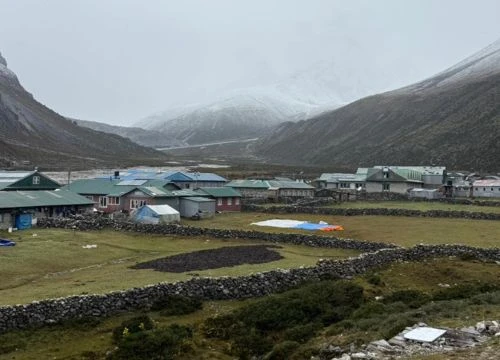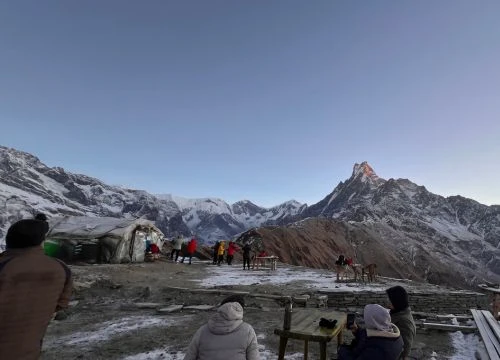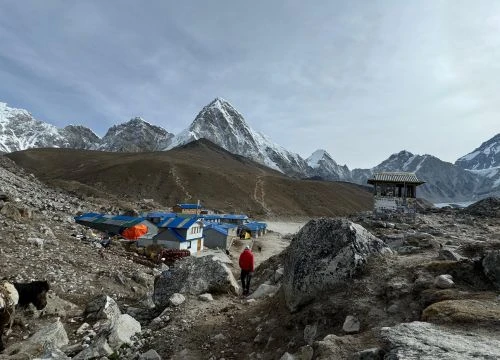Religion in Nepal is like a colorful quilt of different beliefs and traditions deeply woven into the country’s way of life. Moreover, it’s where people mostly follow Hinduism, but Buddhism is also a big part of the picture. Additionally, you’ll find smaller groups of Muslims, Christians, and others. The mix of Hinduism and Buddhism is especially interesting; for instance, places like Lumbini, where Buddha was born, and temples contribute to this unique blend. Consequently, this variety harmonizes people, making festivals, rituals, and journeys an essential part of Nepalese life, all tied to their deep connection to the land and its customs.
Religion in Nepal
Table of Contents
HINDUISM
Under the lap of the giant Himalayas lies a beautiful country, Nepal, rich in diverse cultures and deep spirituality. Moreover, Hinduism is at the heart of its spiritual identity. Over the years, Nepal’s history and varied landscapes have woven together a beautiful tapestry of traditions and beliefs cherished by its people.
Furthermore, Hinduism has deep roots in Nepal, entwined with its ancient civilizations and local beliefs. Throughout the country, you’ll find sacred spots, temples, and shrines honoring various Hindu gods, each brimming with stories of devotion and spirituality.
At the core of Nepal’s Hindu faith stands the Pashupatinath Temple, a UNESCO World Heritage Site and a cherished sanctuary for Hindus worldwide. Along the Bagmati River in Kathmandu lies the holy Pashupatinath Temple, dedicated to Lord Shiva, the supreme Hindu deity. Additionally, people journey from distant places to pay respects to Lord Shiva, seeking blessings for health, wealth, and spiritual growth.
Moreover, besides Pashupatinath, Nepal has many other sacred places reflecting Hindu traditions. From the ancient temples of Bhaktapur to the peaceful Lake Gosainkunda, each spot has its own charm, drawing pilgrims and seekers on spiritual journeys.
Furthermore, the Kathmandu Valley has temples and monuments showcasing Nepal’s deep religious roots. The grand temples, intricate carvings, and stone sculptures tell tales of devotion and craftsmanship, embodying Nepali Hinduism.
Nepal’s culture blends Hinduism and indigenous beliefs, fostering religious diversity and cultural exchange across its landscapes.
Despite its rich religious heritage, Nepal faces challenges as it modernizes. The country’s Hindu traditions sometimes clash with evolving social and political landscapes, sparking dialogue and adaptation.
HINDU’S FESTIVALS
The festival of Maha Shivaratri is a big deal at Pashupatinath, attracting crowds of devotees eager to join the celebrations. During this special time, the temple bursts with colorful processions, rituals, and a strong sense of devotion.
Nepal’s festivals are vibrant expressions of faith, uniting communities in joyous celebration and reverence. From Dashain’s colorful festivities to Teej’s lively gatherings, each event is rich with symbolism and meaning.
During Nepal’s Indra Jatra festival, the Kumari, Kathmandu’s living goddess, plays a big role. The festival celebrates Lord Indra’s victory, the Hindu God of rain. It includes rituals and events.
A key part of the festival is the chariot procession of Akash Bhairav, a form of Lord Shiva. The Kumari rides in a palanquin, parading through Kathmandu’s streets with other gods and cultural symbols. The Kumari’s presence symbolizes the connection between gods and people. As the living goddess Taleju, she blesses everyone, bringing them luck and protection. Indra Jatra blends Hinduism with Nepali culture, showcasing the Kumari as a central figure linking the spiritual and earthly worlds.
In essence, Hinduism in Nepal isn’t just about rituals; it’s a way of life intertwined with history, culture, and identity. As Nepal embraces change, its Hindu heritage and religion in Nepal, remain a source of inspiration, guiding its people on paths of spirituality and cultural renewal.
BUDDHISM
 For people in Nepal, Buddhism isn’t just about beliefs; it’s like a map to finding peace inside and understanding life better. Additionally, as you explore Nepal, you’ll discover calm monasteries hidden in the hills, prayer flags swaying gently in the wind, and peaceful chants filling the valleys. These scenes vividly illustrate how Buddhism significantly impacts religion in Nepal.
For people in Nepal, Buddhism isn’t just about beliefs; it’s like a map to finding peace inside and understanding life better. Additionally, as you explore Nepal, you’ll discover calm monasteries hidden in the hills, prayer flags swaying gently in the wind, and peaceful chants filling the valleys. These scenes vividly illustrate how Buddhism significantly impacts religion in Nepal.
Moreover, Siddhartha Gautama, the enlightened one, was born in Lumbini, Nepal, over two millennia ago. Consequently, his birthplace has since become a sacred spot where people from all walks of life come to reflect and meditate under the shade of ancient trees, contemplating the Buddha’s teachings.
Furthermore, traveling through Nepal’s valleys and mountains, you’ll discover a beautiful blend of Buddhist traditions and practices. The Kathmandu Valley, with its stunning stupas and pagodas, showcases Nepal’s rich Buddhist art and architectural heritage. Notably, the Swayambhunath Stupa, known for its wise eyes overlooking the valley, provides a peaceful haven for travelers seeking to escape life’s hustle and bustle. This reflects the deep influence of religion in Nepal.
TRADITIONS AND FESTIVALS IN BUDDHISM
Monastic life holds a special place in Nepali Buddhism. Monasteries, known as gompas, are scattered across the land, providing a haven for monks and nuns devoted to spiritual growth.
These communities live by the principles of compassion, mindfulness, and letting go of attachments.
Buddhist festivals are an integral part of life in Nepal, bringing joy and respect. People celebrate Buddha Jayanti enthusiastically throughout the country, marking the Buddha’s birth, enlightenment, and passing. During these festivities, monks chant sacred texts, devotees offer flowers and incense, and the wisdom of the Buddha resonates in every corner.
But beyond the rituals, Buddhism in Nepal shapes everyday life. It’s in the kindness of strangers, the simplicity of village living, and the respect for all living beings. The concept of karma, the idea that our actions have consequences, guides Nepalese toward ethical living and doing what’s right.
In a world filled with uncertainty, Buddhism offers hope and resilience. Its teachings remind us to accept change gracefully and to show compassion to others. In Nepal, these teachings aren’t just theories—they’re part of everyday life, woven into the very fabric of society.
As the sun sets behind the Himalayas, casting a golden glow, the enduring spirit of Buddhism in Nepal shines brightly. It stands as a testament to the potency of faith, resilience, and the innate ability of humanity to evolve. In the serenity of its monasteries and the warmth of its people, Nepal invites seekers of truth and peace to embark on a journey of self-discovery and awakening.
In the end, Buddhism, as a major religion in Nepal, isn’t just a religion. It’s a way of life and a gentle reminder that serenity is always within reach amidst life’s chaos.
ISLAM (Muslim)
 In Nepal, only a small portion of people, around 4%, practice Islam. The majority of Nepalese follow Hinduism or Buddhism. Muslims mainly live in the Terai region close to India and in cities like Kathmandu and Pokhara. They come from diverse backgrounds and have different ways of practicing Islam. Mosques and Islamic centers are significant places to pray and bond with their community. Overall, while Islam is a minority religion in Nepal, it still holds importance for those who practice it.
In Nepal, only a small portion of people, around 4%, practice Islam. The majority of Nepalese follow Hinduism or Buddhism. Muslims mainly live in the Terai region close to India and in cities like Kathmandu and Pokhara. They come from diverse backgrounds and have different ways of practicing Islam. Mosques and Islamic centers are significant places to pray and bond with their community. Overall, while Islam is a minority religion in Nepal, it still holds importance for those who practice it.
In Nepal, Muslims celebrate important festivals: Eid al-Fitr, known as “Saghar Dawa” or “Ramadan Eid,” ends Ramadan with prayers, feasting, and giving gifts. They gather in mosques for special prayers and meals. Eid al-Adha, or “Bakrid,” honors Ibrahim’s sacrifice by sharing meat with family and the needy after special prayers and family gatherings. Mawlid al-Nabi celebrates Prophet Muhammad’s birth with poetry, sermons, and sharing food. Shab-e-Barat, or “Bara’a Raat,” is a Night of Forgiveness. Muslims pray, read the Quran, seek forgiveness, and visit graves to remember loved ones, fostering reflection and spiritual growth.
CHRISTIANITY
 Hinduism and Buddhism are the main religions in Nepal, but Christianity has also made its mark on the country.
Hinduism and Buddhism are the main religions in Nepal, but Christianity has also made its mark on the country.
Christianity started to spread in Nepal during the 18th century when European missionaries came. But it wasn’t until the middle of the 20th century that missionaries and Christian groups pushed it forward. One important group, the United Mission to Nepal (UMN), started in 1951 and helped set up the first Christian mission there, even though they faced many challenges from the law and society. They built churches, schools, and hospitals across Nepal, which helped the country grow socially and spiritually.
Nepali Christians love celebrating Christmas and Easter. During Christmas, which marks Jesus’ birth, churches get all decked out with decorations, and people come together for prayers, singing carols, and big meals. Easter, when Jesus rose from the dead, is also a big deal. They have special church services, do symbolic rituals, and share meals, bringing everyone closer and spreading peace messages.
KIRAT,
In Nepal, the Kirat people are a native ethnic group living mainly in the eastern hills and parts of the central region. They are an essential part of Nepal’s diverse culture, keeping alive traditions, languages, and beliefs that go back centuries. Thus, besides Hinduism, Kirat is the oldest religion in Nepal.
The Kirat community, including subgroups like Rai, Limbu, Sunuwar, Yakkha, and others, each with its language and customs, contributes significantly to Nepal’s cultural richness and diversity.
Ancient texts shed light on the Kirat people of Nepal, although detailed records are scarce. The Mahabharata portrays them as skilled warriors and hunters in the Himalayan region, while the Manusmriti mentions them among northern frontier tribes. Hindu Puranas like the Vishnu Purana and the Bhagavata Purana also reference the Kiratas living in ancient Himalayan Nepal.
Moreover, local legends and historical chronicles like ‘Kirat Rajya Laxmi,’ ‘Kirat Kulal,’ and ‘Yakshya Leela’ provide glimpses into the Kirat dynasty’s rule preceding the Licchavi dynasty in Nepal. Even the Rigveda, one of the oldest Indian texts, hints at tribes dwelling in the Himalayas, possibly including ancestors of the Kirat people. This rich heritage adds depth to the tapestry of religion in Nepal.
KIRAT TRADITIONS AND FESTIVALS
The Kirat culture actively showcases its lively festival calendar, reflecting its strong bond with nature, farming, and spirituality. Sakela Udhauli and Sakela Ubhauli are important festivals for the Rai and Limbu groups, marking seasonal changes with dances and rituals for good harvests and community well-being.
Moreover, Chaite Dashain and Yele Sambat are other significant Kirat festivals, with unique customs celebrating New Year and cultural heritage.
These festivals unite Kirat communities, passing down traditions to younger generations through dances, songs, and rituals, fostering unity and identity.
In addition to festivals, Kirat communities observe various customs for marriages, births, and funerals, strengthening social ties and upholding cultural values.
OTHER MINOR RELIGIONS
In addition to Hinduism, Buddhism, Islam, Kirat, and Christianity, Nepal embraces a range of other religious beliefs. These include Jainism, a small but committed community that upholds non-violence, truthfulness, and non-attachment. Sikhism, followed by a modest number, advocates equality and devotion to one God. Bon, an ancient Himalayan religion, blends shamanism, animism, and ancestor worship. Though small in Nepal, the Baha’i Faith emphasizes human unity, education, and eradicating prejudice. This diverse religious landscape enriches the tapestry of religion in Nepal, showcasing its cultural depth and spiritual variety.
CONCLUSION
In summary, religion in Nepal is like a colorful mix, showing its rich culture and deep spirituality. From the mountains to the busy cities, people are deeply devoted. Hinduism and Buddhism blend together, with their special places and traditions woven into daily life. Nepal welcomes people of different faiths, like Muslims and Christians, making it diverse and accepting. Among its beautiful scenery and old customs, Nepal’s religious scene promotes tolerance, unity, and spiritual growth. Hence, it invites everyone to explore its profound teachings and timeless wisdom.




